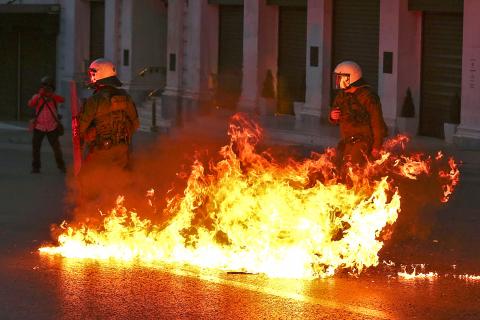Greek lawmakers late on Sunday adopted a controversial package of pension cuts and tax hikes despite mass public opposition, bowing to creditor demands in a bid to unlock the next tranche of badly needed bailout funds.
The unpopular reforms, which saw thousands take to the streets in protest, passed thanks to the SYRIZA-led coalition government’s slim majority in parliament, based on an Agence France-Presse count.
As expected, the main New Democracy opposition party voted against the bill, which will reduce Greece’s highest pension payouts, merge several pension funds, increase contributions and raise taxes for those on medium and high incomes.

Photo: AP
They are the latest reforms demanded by the EU and the IMF in exchange for fresh funds from Greece’s 86 billion euro (US$95 billion) bailout agreed in July last year, the third for the debt-laden nation since 2010.
The vote came just hours before an emergency meeting of eurozone finance ministers in Brussels, who are racing to finalize their long-stalled first review of Greece’s reform efforts so Athens can repay the European Central Bank (ECB) billions of euros in July.
The ministers from the 19 countries that use the euro — the Eurogroup — are also expected to discuss debt relief for Greece, which the IMF has demanded as a condition for a new agreement.
In the run-up to the parliamentary debate, angry unions staged a general strike that paralyzed the nation’s public transport for a third straight day on Sunday, while about 26,000 people took to the streets of Athens and Greece’s second-largest city, Thessaloniki, in protest at the pensions and tax overhaul.
Brief clashes erupted outside the parliament in Athens ahead of the vote, with youths throwing Molotov cocktails and flares at riot police who responded with volleys of tear gas, AFP reporters saw.
Greek Prime Minister Alexis Tsipras, who has said reform is needed to prevent the pension system collapsing in a few years, defended the changes in parliament earlier on Sunday.
“The system requires root-and-branch reform that previous governments have not dared to undertake,” he told lawmakers, adding that the reforms would not affect those on low incomes, something that was the result of “long and hard negotiations with creditors.”

POLITICAL PRISONERS VS DEPORTEES: Venezuela’s prosecutor’s office slammed the call by El Salvador’s leader, accusing him of crimes against humanity Salvadoran President Nayib Bukele on Sunday proposed carrying out a prisoner swap with Venezuela, suggesting he would exchange Venezuelan deportees from the US his government has kept imprisoned for what he called “political prisoners” in Venezuela. In a post on X, directed at Venezuelan President Nicolas Maduro, Bukele listed off a number of family members of high-level opposition figures in Venezuela, journalists and activists detained during the South American government’s electoral crackdown last year. “The only reason they are imprisoned is for having opposed you and your electoral fraud,” he wrote to Maduro. “However, I want to propose a humanitarian agreement that

ECONOMIC WORRIES: The ruling PAP faces voters amid concerns that the city-state faces the possibility of a recession and job losses amid Washington’s tariffs Singapore yesterday finalized contestants for its general election on Saturday next week, with the ruling People’s Action Party (PAP) fielding 32 new candidates in the biggest refresh of the party that has ruled the city-state since independence in 1965. The move follows a pledge by Singaporean Prime Minister Lawrence Wong (黃循財), who took office last year and assumed the PAP leadership, to “bring in new blood, new ideas and new energy” to steer the country of 6 million people. His latest shake-up beats that of predecessors Lee Hsien Loong (李顯龍) and Goh Chok Tong (吳作棟), who replaced 24 and 11 politicians respectively

Young women standing idly around a park in Tokyo’s west suggest that a giant statue of Godzilla is not the only attraction for a record number of foreign tourists. Their faces lit by the cold glow of their phones, the women lining Okubo Park are evidence that sex tourism has developed as a dark flipside to the bustling Kabukicho nightlife district. Increasing numbers of foreign men are flocking to the area after seeing videos on social media. One of the women said that the area near Kabukicho, where Godzilla rumbles and belches smoke atop a cinema, has become a “real

‘POINT OF NO RETURN’: The Caribbean nation needs increased international funding and support for a multinational force to help police tackle expanding gang violence The top UN official in Haiti on Monday sounded an alarm to the UN Security Council that escalating gang violence is liable to lead the Caribbean nation to “a point of no return.” Special Representative of the UN Secretary-General for Haiti Maria Isabel Salvador said that “Haiti could face total chaos” without increased funding and support for the operation of the Kenya-led multinational force helping Haiti’s police to tackle the gangs’ expanding violence into areas beyond the capital, Port-Au-Prince. Most recently, gangs seized the city of Mirebalais in central Haiti, and during the attack more than 500 prisoners were freed, she said.